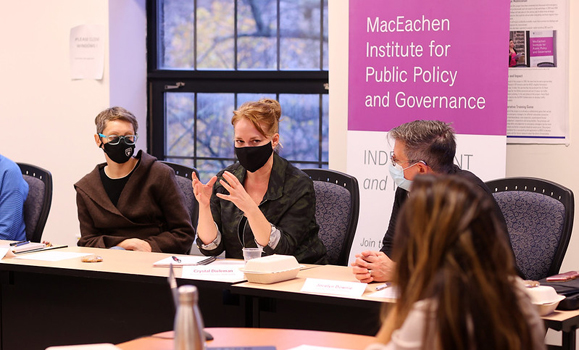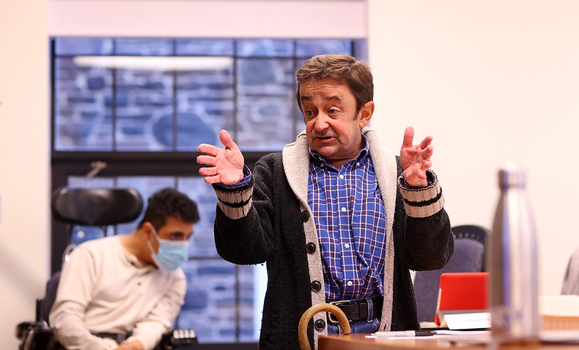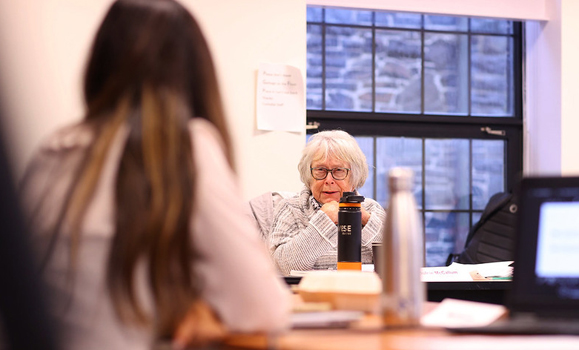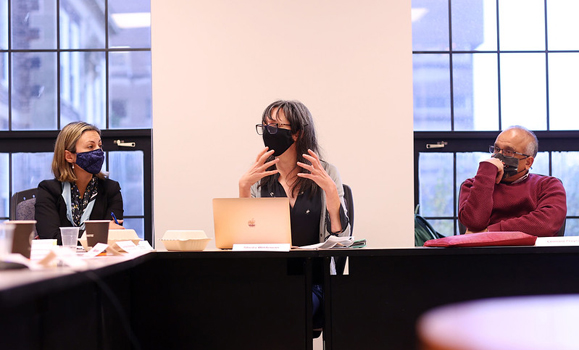When created with the rights and needs of people at its core, public policy has the ability to change lives. However, those with lived experience ÔÇö whom policy directly affects ÔÇö are too often left out of the conversation.
ThatÔÇÖs how Keiko Shikako, an associate professor in the McGill School of Physical and Occupational Therapy, put it during a recent workshop co-hosted by Dal's MacEachen Institute for Public Policy and Governance and Health Law Institute.
The successful implementation of policy requires significant understanding and knowledge of the subject at hand, of course, but as Dr. Shikako noted ÔÇ£there is a false understanding that academic research is the only knowledge that should be mobilized.ÔÇØ
Dr. Shikako provided an opening presentation at the interdisciplinary workshop on Academic Participation in Social Justice Organizing, which also included a focused discussion among invited guests.
The workshop, facilitated by ╣¹¢┤╩ËãÁ law professors Sheila Wildeman and Constance MacIntosh, brought individuals from Dal┬á and the greater community together to discuss the challenges university and community partnerships face when working together to inform policy creation, reform, and oversight. It was the MacEachen InstituteÔÇÖs first in-person event since the pandemic began in March 2020, and the room was lively with people buzzing to be sharing space and exchanging ideas.

Workshop participants engage in discussion.
Case in point
An important part of Dr. ShikakoÔÇÖs work is focused on bringing academia and lived experience together in order to create policy that is applicable to the real world. For her, as Canada Research Chair in Childhood Disability: Participation and Knowledge Translation, these efforts are made in the context of improving the lives of children with disabilities.
Among the workshopÔÇÖs other guests was Steve Estey, a former Human Rights Officer with Disabled PeoplesÔÇÖ International (DPI), who has worked for more than 30 years to promote the human rights and democratic participation of people with disabilities in Nova Scotia, Canada, and internationally.
Estey echoed Dr. ShikakoÔÇÖs comments that people with disabilities often donÔÇÖt get a seat at the table.
ÔÇ£At the end of the day, the only way people with disabilities are going to be equal in this society that we live in is if weÔÇÖre seen, listened to, and part of the decision-making process,ÔÇØ he said.

Steve Estey
According to Estey, people with disabilities make up 22 per cent of the Canadian population, and yet disability is rarely talked about as a human rights issue. He knows this not only from his extensive experience working in disability justice, but also through living everyday as part of that 22 per cent.
Estey was present in 2010 when Canada ratified the United Nations Convention on the Rights of Persons with Disabilities (UNCRPD) and has committed much of the last decade to furthering its goal of ensuring full and equal enjoyment of human rights and freedoms by persons with disabilities.
ÔÇ£The main finding in CanadaÔÇÖs initial CRPD report [presented in 2014] was that there was no data on children with disabilities,ÔÇØ said Estey. ÔÇ£And as a guy who has worked in disability rights for a painfully long time, thatÔÇÖs a really telling comment. Because the essence of what weÔÇÖre talking about here, the essence of the discrimination that disabled people face, is really all about the fact that weÔÇÖre invisible.ÔÇØ

Pinpointing problems
For many researchers and community activists, the lack of data on persons with disabilities, particularly in children, is alarming. This has left many exploring how academia and community groups can better work together to organize and have meaningful impact at the policy level.
During the discussion portion of the workshop, guests had the opportunity to discuss these strategies based on their own experiences in academia and civil society advocacy. One researcher at ╣¹¢┤╩ËãÁ brought attention to the intersection of disability and poverty and the frustration of how funding sources often make it difficult to compensate community members as co-researchers, and instead only as ÔÇ£informants.ÔÇØ
Another academic pointed out that the challenges of effective participation of members of the disability community in collaborative work include accessibility services that require dedicated funding, such as Communications Access Realtime Translation (CART) or American Sign Language (ASL) interpreters.
One of the occupational therapists in attendance spoke about her experience working in correctional systems and the challenges of ideological tensions as well as pragmatic political considerations like navigating the shift to a new elected government. Those working for policy change often find themselves ÔÇ£preaching to the choir,ÔÇØ and the people that need to be on board to push policy forward are often the people who have declined to be in the room.

Participants discuss university and community partnerships.
The power of academic-community partnerships
Estey thoughtfully responded to these challenges and spoke from his own experience mobilizing from the community side. He said that the only times he has really felt like the government and policy-makers were on the side of people with disabilities was when there was an academic-community partnership.
ÔÇ£From the community side, thereÔÇÖs real value in partnerships with academics because as IÔÇÖve learned, trying to do it alone as an NGO, particularly when youÔÇÖre a disability organization and are very poor, marginalized and poorly resourced, is extremely challenging,ÔÇØ said Estey. ÔÇ£So, I would encourage you in all of your work to think about this and the potential of partnering with people in the disability sector.ÔÇØ
Estey said the situation is beginning to change in social justice organizing because of the work of academics, including those present at the workshop. He said that people like Dr. Shikako are moving matters in the right direction and reiterated the necessity of disability becoming part of mainstream discussions.
ÔÇØBringing lived experiences to the people who are making the decisions, or to other tables, I think is a great privilege and opportunity,ÔÇØ said Dr. Shikako of her work at the close of the workshop.
A detailed briefing note based on the discussion will soon be available at dal.ca/MIPP.

